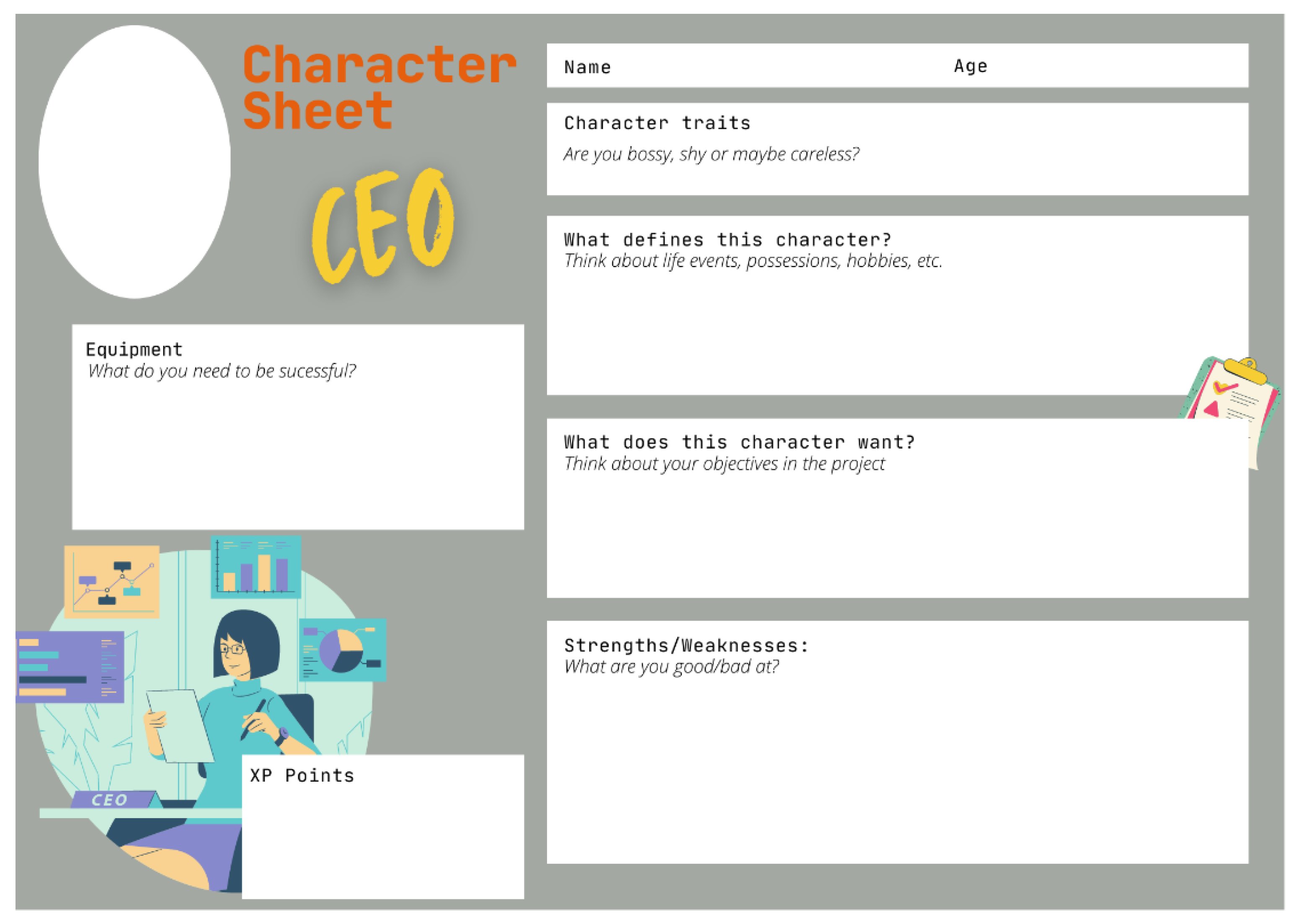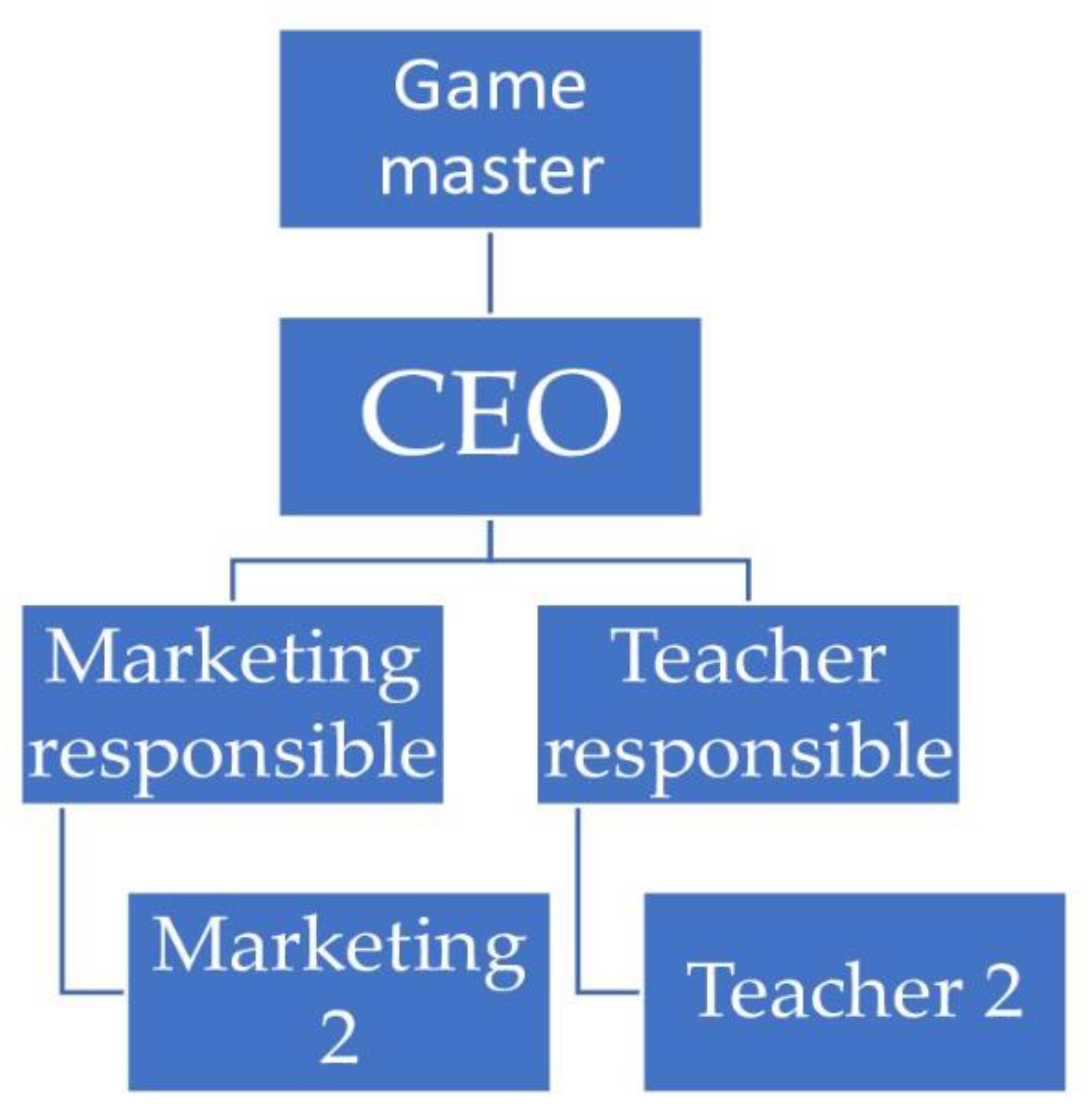How to Run Your Own Online Business: A Gamification Experience in ESL
Abstract
:1. Introduction
2. Theoretical Framework
2.1. Literature Review: Gamificación in English as Second Language
2.2. The Use of Role-Playing Games in Education
3. Materials and Methods
3.1. Participants and Context
3.2. Methods
3.3. Data Collection Instrument
3.4. Data Collection Techniques
4. Results
4.1. Students’ Perceptions about Their Own Proficiency Level, Once the Gamification Is Over
4.2. Student’s Perceptions about the Use of Role-Playing Games in the ESL Classroom Once the Gamification Is Over
4.3. Students’ Perceptions about Educational Gamification in the ESL Classroom Once the Gamification Is Over
4.4. Students’ Perceptions about the Use of English during the Game Once the Gamification Is Over
4.5. Students’ General Perceptions about the Gamified Experience
5. Discussion
Author Contributions
Funding
Institutional Review Board Statement
Informed Consent Statement
Data Availability Statement
Acknowledgments
Conflicts of Interest
References
- Aithal, P.S.; Aithal, S. An innovative education model to realize ideal education system. Int. J. Sci. Res. Manag. (IJSRM) 2015, 3, 2464–2469. [Google Scholar]
- Garone, P.; Nesteriuk, S. Gamification and Learning: A Comparative Study of Design Frameworks. In Digital Human Modeling and Applications in Health, Safety, Ergonomics and Risk Management; Duffy, V., Ed.; Healthcare Applications, HCII 2019; Lecture Notes in Computer Science; Springer: Cham, Switzerland, 2019; Volume 11582, pp. 473–487. [Google Scholar]
- Girardelli, D. Impromptu speech gamification for ESL/EFL students. Commun. Teach. 2017, 31, 156–161. [Google Scholar] [CrossRef]
- Hamari, J.; Koivisto, J.; Sarsa, H. Does Gamification Work?—A Literature Review of Empirical Studies on Gamification. In Proceedings of the Hawaii International Conference on System Sciences, Waikoloa, HI, USA, 6–9 January 2014; pp. 3025–3034. [Google Scholar] [CrossRef]
- Sourav, A.I.; Lynn, N.D.; Suyoto, S. Teaching English tenses in an informal cooperative study group using smart multimedia and gamification. IOP Conf. Ser. Mater. Sci. Eng. 2021, 1098, 032035. [Google Scholar] [CrossRef]
- Su, C.-H.; Cheng, C.-H. A mobile gamification learning system for improving the learning motivation and achievements. J. Comput. Assist. Learn. 2014, 31, 268–286. [Google Scholar] [CrossRef]
- Wortley, D. The Future of Serious Games and Immersive Technologies and Their Impact on Society. In Trends and Applications of Serious Gaming and Social Media; Springer: Singapore, 2014; pp. 1–14. [Google Scholar] [CrossRef]
- Deterding, S.; Dixon, D.; Khaled, R.; Nacke, L. From game design elements to gamefulness: Defining gamification. In Proceedings of the 15th International Academic MindTrek Conference: Envisioning Future Media Environments, Tampere, Finland, 28–30 September 2011; ACM: New York, NY, USA, 2011. [Google Scholar]
- Werbach, K. (Re)Defining Gamification: A Process Approach, persuasive technology. Lect. Notes Comput. Sci. 2014, 266–272. [Google Scholar] [CrossRef]
- Kapp, K. The Gamification of Learning and Instruction: Game–Based Methods and Strategies for Training and Education; John Wiley & Sons: Hoboken, NJ, USA, 2012. [Google Scholar]
- Sarmiento, B.R.; Prados, M.H.; Bernal, N.C.; Gómez, M.C.A. Alfabetización del profesorado en gamificación mediada por las TIC. Estado del arte. Med. Educ. 2021, 12, 53–65. [Google Scholar] [CrossRef]
- Peris, F.J.S.I. Gamificación. Educ. Knowl. Soc. (EKS) 2015, 16, 13–15. [Google Scholar] [CrossRef] [Green Version]
- Parreño, J.M.; Ibáñez, E.M.; Arroyo, A.A. The use of gamification in education: A bibliometric and text mining analysis. J. Comput. Assist. Learn. 2016, 32, 663–676. [Google Scholar] [CrossRef]
- Villagrasa, S.; Fonseca, D.; Redondo, E.; Duran, J. Teaching Case of Gamification and Visual Technologies for Education. J. Cases Inf. Technol. 2014, 16, 38–57. [Google Scholar] [CrossRef] [Green Version]
- Dehghanzadeh, H.; Fardanesh, H.; Hatami, J.; Talaee, E.; Noroozi, O. Using gamification to support learning English as a second language: A systematic review. Comput. Assist. Lang. Learn. 2019, 1–24. [Google Scholar] [CrossRef]
- Yunyongying, P. Gamification: Implications for Curricular Design. J. Grad. Med. Educ. 2014, 6, 410–412. [Google Scholar] [CrossRef] [PubMed] [Green Version]
- Kapp, K.; Blair, L.; Mesch, R. The gamification of learning and instruction fieldbook. In Ideas into Practice; Wiley: Hoboken, NJ, USA, 2013. [Google Scholar]
- Kurniatun, F.; Suhartono, L.; Wardah, W. Improving students’ speaking skill through role play activity by using hand puppet. J. Pendidik. Dan Pembelajaran Khatulistiwa 2020, 9, 1–9. [Google Scholar]
- Das, D.; Neog, R. Language game: Ludwig wittgenstein. Int. J. Manag. 2020, 11, 143–148. [Google Scholar] [CrossRef]
- Dehganzadeh, H.; Dehganzadeh, H. Investigating effects of digital gamification-based language learning: A systematic review. J. Engl. Lang. Teach. Learn. 2020, 12, 53–93. [Google Scholar]
- Singh, C.; Ong, E.; Singh, T. A review of research on teachers’ views on integrating gamification and technology in english as second language classroom. J. Crit. Rev. 2020, 7, 4333–4341. [Google Scholar] [CrossRef]
- Abarghoui, M.A.; Taki, S. Measuring the Effectiveness of Using "Memrise" on High School Students’ Perceptions of Learning EFL. Theory Pract. Lang. Stud. 2018, 8, 1758–1765. [Google Scholar] [CrossRef] [Green Version]
- Jiménez-Sánchez, M.; Gargallo, N. Gamification and Students’ Motivation: Using Quizizz in the English as a Foreign Language (efl) Classroom. Studia Universitatis Petru Maior. Philologia 2020, 2, 143–157. Available online: https://www.proquest.com/scholarly-journals/gamification-students-motivation-using-quizizz/docview/2475532461/se-2?accountid=17225 (accessed on 23 March 2021).
- Oliveira, S.; Porto, I.P.D.; Cruz, M. The Gamification Octalysis Framework within the Primary English Teaching Process: The Quest for a Transformative Classroom. Rev. Lusófona Educ. 2018, 41, 63–82. [Google Scholar] [CrossRef]
- Lam, Y.W.; Hew, K.F.; Chiu, K.F. Improving argumentative writing: Effects of a blended learning approach and gamification. Lang. Learn. Technol. 2017, 22, 97–118. [Google Scholar]
- Fahim, M.; Sabah, S. An Ecological Analysis of the Role of Role-play Games as Affordances in Iranian EFL Pre-university Students’ Vocabulary Learning. Theory Pract. Lang. Stud. 2012, 2, 1276. [Google Scholar] [CrossRef]
- Yen, L.; Chen, C.; Juang, H. Effects of Mobile Game-Based English Vocabulary Learning APP on Learners’ Perceptions and Learning Performance: A Case Study of Taiwanese EFL Learners. Academic Conferences International Limited: Sonning Common, UK, 2016. [Google Scholar]
- Mentzer, F. Dungeons & Dragons: Players Manual; TSR Hobbies Inc.: Lake Geneva, WI, USA, 1983. [Google Scholar]
- Moreno-Guerrero, A.-J.; Rodríguez-Jiménez, C.; Gómez-García, G.; Navas-Parejo, M.R. Educational Innovation in Higher Education: Use of Role Playing and Educational Video in Future Teachers’ Training. Sustainability 2020, 12, 2558. [Google Scholar] [CrossRef] [Green Version]
- Nellhaus, T. Online Role-playing Games and the Definition of Theatre. New Theatr. Q. 2017, 33, 345–359. [Google Scholar] [CrossRef]
- Ntokos, K. Swords and sorcery: A structural gamification framework for higher education using role-playing game elements: Association for Learning Technology Journal. Res. Learn. Technol. 2019, 27. [Google Scholar] [CrossRef] [Green Version]
- Mackay, D. The Fantasy Role-Playing Game: A New Performing Art; McFarland & Company: Jefferson, MO, USA, 2001. [Google Scholar]
- Gordon, T. Using Role-Play to Foster Transformational and Social Action Multiculturalism in the ESL Classroom. TESOL J. 2012, 3, 698–721. [Google Scholar] [CrossRef]
- Nuriyanti, K. Using Role-Play Techniques to Improve Speaking Ability for Students in the Classroom; Universidad Islámica de Malang: Medina, Saudi Arabia, 2017. [Google Scholar]
- Wulandari, W.; Ayuningtias, D.O.; Yana, Y. The use of role play to improve students’ speaking skill. Proj. Prof. J. Engl. Educ. 2019, 2, 416–420. [Google Scholar] [CrossRef]
- Hernández-Ramos, J.P.; Belmonte, M.L. Evaluación del empleo de Kahoot! en la enseñanza superior presencial y no presencial. Educ. Knowl. Soc. (EKS) 2020, 21, 13. [Google Scholar] [CrossRef]
- Rueckert, D.; Pico, K.; Kim, D.; Sánchez, X.C. Gamifying the foreign language classroom for brain-friendly learning. Foreign Lang. Ann. 2020, 53, 686–703. [Google Scholar] [CrossRef]
- Dorion, K.R. Science through Drama: A multiple case exploration of the characteristics of drama activities used in secondary science lessons. Int. J. Sci. Educ. 2009, 31, 2247–2270. [Google Scholar] [CrossRef] [Green Version]
- Purnama, Y.I.; Nurdianingsih, F. The Impact of Higher Order Thinking Skills (HOTS) Instructions in Teaching EFL Speaking Skill from the Perspective of Students’ Motivation. Lingua Cult. 2019, 13, 313–319. [Google Scholar] [CrossRef] [Green Version]
- Jassem, K. Teaching gamification. In Proceedings of the 7th International Conference on Education and New Learning Technologies (EDULEARN), Barcelona, Spain, 6–8 July 2015. [Google Scholar]
- McConville, J.R.; Rauch, S.; Helgegren, I.; Kain, J.-H. Using role-playing games to broaden engineering education. Int. J. Sustain. High. Educ. 2017, 18, 594–607. [Google Scholar] [CrossRef]
- Shortt, M.; Tilak, S.; Kuznetcova, I.; Martens, B.; Akinkuolie, B. Gamification in mobile-assisted language learning: A systematic review of Duolingo literature from public release of 2012 to early 2020. Comput. Assist. Lang. Learn. 2021, 1–38. [Google Scholar] [CrossRef]
- Ishaq, K.; Zin, N.A.M.; Rosdi, F.; Jehanghir, M.; Ishaq, S.; Abid, A. Mobile-assisted and gamification-based language learning: A systematic literature review. PeerJ Comput. Sci. 2021, 7, e496. [Google Scholar] [CrossRef] [PubMed]
- Ramadoss, R.; Wang, Q. Evaluation of a web-based assessment tool for learning grammar at the primary school level. Int. J. Contin. Eng. Educ. Life-Long Learn. 2012, 22, 175. [Google Scholar] [CrossRef]
- Eick, D.; Guikema, J.P. Games as ’Defining Moments’ of the College Experience: The Impact of Reacting to the Past in French. Fr. Rev. 2019, 93, 159–174. [Google Scholar] [CrossRef]
- García-Sanz, M. Fundamentos Teóricos y Metodológicos de la Evaluación de Programas; Marín, D., Ed.; Routledge: Oxfordshire, UK, 2012. [Google Scholar]
- Salán, N.; Rupérez, E.; Illescas, S.; Jorba, J.; Llumà, J.; Rodríguez, D.; Torres, Y. El Juego de Rol Como Metodología Activa. En M. Mata Montes, Innovación Educativa en Las Enseñanzas Técnicas; Universidad de Castilla-La Mancha: Ciudad Real, Spain, 2015; pp. 1509–1518. [Google Scholar]
- Almenar, V.; Maldonado, M.; Hernández-Sancho, F. Una aproximación Didáctica a la Contratación Bursátil a Través de un Juego de rol en Google-Docs. Rev. De Docencia Univ. 2009, 7. Available online: https://revistas.um.es/redu/article/view/92601 (accessed on 3 April 2021). [CrossRef]
- Hernández-Prados, M.A.; Belmonte, M.L.; García-Cantero, I. Validación de un instrumento de recogida de información sobre juegos de mesa en la enseñanza de inglés como lengua extranjera. Estudios 2021, 2, 1–23. [Google Scholar] [CrossRef]
- Huq, A.; Gilbert, D. All the world’s a stage: Transforming entrepreneurship education through design thinking. Educ. + Train. 2017, 59, 155–170. [Google Scholar] [CrossRef]
- Thao, T.Q.; Nguyet, D.T.N. Four aspects of English speaking difficulties encountered by tertiary English-majored students. Soc. Sci. 2020, 9, 53–64. [Google Scholar] [CrossRef]
- Chiang, H.-H. Kahoot! In an EFL Reading Class. J. Lang. Teach. Res. 2020, 11, 33–44. [Google Scholar] [CrossRef]
- Rojas, M.A.; Villafuerte, J. The Influence of Implementing Role-play as an Educational Technique on EFL Speaking Development. Theory Pract. Lang. Stud. 2018, 8, 726–732. [Google Scholar] [CrossRef]
- Lynch, T.; Tompkins, J.E.; Van Driel, I.I.; Fritz, N. Sexy, Strong, and Secondary: A Content Analysis of Female Characters in Video Games across 31 Years. J. Commun. 2016, 66, 564–584. [Google Scholar] [CrossRef]
- Sancho-Thomas, P.; Fuentes-Fernández, R.; Fernández-Manjón, B. Learning teamwork skills in university programming courses. Comput. Educ. 2009, 53, 517–531. [Google Scholar] [CrossRef]
- Nieto-Escamez, F.A.; Roldán-Tapia, M.D. Gamification as Online Teaching Strategy During COVID-19: A Mini-Review. Front. Psychol. 2021, 12, 648552. [Google Scholar] [CrossRef] [PubMed]
- Sepúlveda, H. Promoviendo aprendizajes significativos en la enseñanza universitaria de la Historia a través de un juego de roles. Estud. Pedagóg. 2020, 46, 97–121. [Google Scholar] [CrossRef]
- Reeve, J. Teachers as Facilitators: What Autonomy-Supportive Teachers Do and Why Their Students Benefit. Elementary Sch. J. 2006, 106, 225–236. [Google Scholar] [CrossRef] [Green Version]
- Luna, Y.; Conde, A.; Rincón, P. Propuesta Didáctica para el Mejoramiento de la Lectura y Escritura: El Juego de Rol en la Virtualidad. Rev. Conoc. Investig. Y Educación. CIE 2021, 1, 31–43. Available online: http://revistas.unipamplona.edu.co/ojs_viceinves/index.php/CIE/article/view/4462 (accessed on 5 April 2021).
- Kirk, G.A. Using role play exercises to enhance communication competence and persuasive communication skills in entrepreneurship programs. Issues Inf. Syst. 2018, 19, 217–225. [Google Scholar]
- Hasmawaty, H.; Syam, H.; Saman, A. Validity, Practicality, and Effectiveness: The Last Step in Development of Entrepreneurship Education Based Role-Playing for Kindergarten. Univers. J. Educ. Res. 2020, 8, 8092–8101. [Google Scholar] [CrossRef]
- Humpherys, S.L.; Bakir, N.; Babb, J. Experiential learning to foster tacit knowledge through a role play, business simulation. J. Educ. Bus. 2021, 96, 1–7. [Google Scholar] [CrossRef]
- Radianto, W.E.D.; Santoso, E.B. Start-Up Business: Process and Challenges in Entrepreneurship Education. Mediterr. J. Soc. Sci. 2017, 8, 97–110. [Google Scholar] [CrossRef] [Green Version]
- An, Y.; Zhu, M.; Bonk, C.J.; Lin, L. Exploring instructors’ perspectives, practices, and perceived support needs and barriers related to the gamification of MOOCs. J. Comput. High. Educ. 2020, 33, 64–84. [Google Scholar] [CrossRef]





| Variables | Options | Percentage | Frequency |
|---|---|---|---|
| Age | 16 | 75% | 9 |
| 17 | 25% | 3 | |
| Gender | Girl | 58.3% | 5 |
| Boy | 41.7% | 7 | |
| Attend private classes | Yes | 41.7% | 5 |
| No | 58.3% | 7 | |
| English-speaking relatives | Yes | 25% | 3 |
| No | 75% | 9 | |
| Lived in an English-speaking country | Yes | 0% | 0 |
| No | 100% | 12 |
| X̃ | σ | |
|---|---|---|
| A1.3. My overall proficiency level is: | 3.58 | 0.669 |
| A1.4. My oral comprehension proficiency level (listening) is: | 3.92 | 0.793 |
| A1.5. My written comprehension proficiency level (reading) is: | 3.92 | 0.996 |
| A1.6. My oral production proficiency level (speaking) is: | 3.58 | 0.793 |
| A1.7. My written production proficiency level (writing) is: | 3.50 | 0.798 |
| X̃ | σ | |
|---|---|---|
| B1.1. They help improve my oral comprehension skills (listening). | 4.33 | 0.778 |
| B1.2. They help improve my oral production skills (speaking). | 4.50 | 0.798 |
| B1.3. They help improve my written comprehension skills (reading). | 3.75 | 1.215 |
| B1.4. They help improve my written production skills (writing). | 3.50 | 1.168 |
| B1.5. They help me to be more confident when speaking in English | 4.33 | 0.778 |
| B1.6. They motivate me to participate in class. | 4.42 | 0.669 |
| B1.7. They help meet and get to know better with my classmates | 4.08 | 1.084 |
| X̃ | σ | |
|---|---|---|
| B2.1. I have spoken more in English than in Spanish | 4.53 | 0.559 |
| B2.2. I have been participating constantly during the game | 4.67 | 0.778 |
| B2.3. I have been more focused on learning and enjoying rather than winning | 4.75 | 0.622 |
| B2.4. I have respected my classmates’ turn to play. | 4.42 | 0.793 |
| B2.5. I have listened to my classmates and respected their speaking time | 4.25 | 0.866 |
| B2.6. Everyone could participate more than once during the game | 4.75 | 0.622 |
| X̃ | σ | |
|---|---|---|
| B3.1. I have understood all or almost all conversations held in English with my classmates and/or the teacher. | 4.25 | 0.588 |
| B3.2. I have been able to understand my classmates’ points of view. | 4.42 | 0.793 |
| B3.3. I have spoken in English always or almost always to speak with my classmates. | 4.42 | 0.900 |
| B3.4. I have spoken in English always or almost always with the teacher. | 4.08 | 0.669 |
| B3.5. I have been able to answer always or almost always in English to my classmates when they have posed a question. | 4.08 | 0.793 |
| B3.6. I have been able to answer always or almost always in English with the teacher when he has posed a question. | 4.25 | 0.754 |
| X̃ | σ | |
|---|---|---|
| B4.1. I like the gamification sessions because they are entertaining and motivate me to continue learning. | 4.58 | 0.669 |
| B4.2. I believe that the gamification sessions are effective to improve my English proficiency level. | 4.75 | 0.622 |
| B4.3. I prefer these activities than the usual ones that I do in ESL classes. | 4.58 | 0.669 |
| B4.4. I think it is a good idea to learn English while I play. | 4.67 | 0.651 |
| B4.5. Instructions have been clear and easy to understand. | 4.42 | 0.793 |
| B4.6. There has been enough playing time. | 4.42 | 0.900 |
| B4.7. The classes were well organized. | 4.67 | 0.651 |
| B4.8. The game materials are related to the topics learned in the didactic unit. | 4.58 | 0.793 |
| B4.9. I found it easy to follow the activities. | 4.42 | 0.79 |
Publisher’s Note: MDPI stays neutral with regard to jurisdictional claims in published maps and institutional affiliations. |
© 2021 by the authors. Licensee MDPI, Basel, Switzerland. This article is an open access article distributed under the terms and conditions of the Creative Commons Attribution (CC BY) license (https://creativecommons.org/licenses/by/4.0/).
Share and Cite
Hernández-Prados, M.Á.; Belmonte, M.L.; Manzanares-Ruiz, J.C. How to Run Your Own Online Business: A Gamification Experience in ESL. Educ. Sci. 2021, 11, 697. https://doi.org/10.3390/educsci11110697
Hernández-Prados MÁ, Belmonte ML, Manzanares-Ruiz JC. How to Run Your Own Online Business: A Gamification Experience in ESL. Education Sciences. 2021; 11(11):697. https://doi.org/10.3390/educsci11110697
Chicago/Turabian StyleHernández-Prados, Mª Ángeles, Mª Luisa Belmonte, and Juan Carlos Manzanares-Ruiz. 2021. "How to Run Your Own Online Business: A Gamification Experience in ESL" Education Sciences 11, no. 11: 697. https://doi.org/10.3390/educsci11110697
APA StyleHernández-Prados, M. Á., Belmonte, M. L., & Manzanares-Ruiz, J. C. (2021). How to Run Your Own Online Business: A Gamification Experience in ESL. Education Sciences, 11(11), 697. https://doi.org/10.3390/educsci11110697








